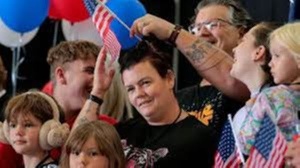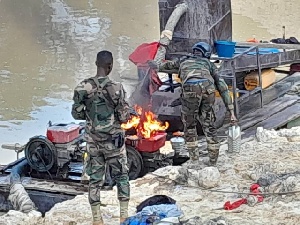Africa News of Thursday, 15 May 2025
Source: www.ghanawebbers.com
Do Afrikaners want to take Trump up on his South African refugee offer?
Ulrich Janse van Vuuren is passionate about showcasing South Africa. He shares beautiful scenes with his social media followers.
The 38-year-old captures moments like Johannesburg's cold mornings and Pretoria's Jacaranda trees. He also highlights Cape Town's popular beaches.
"I love promoting South Africa," he told the BBC. "I won't take up Trump's offer because this is my home." His comments came after some white South Africans left for the US as refugees.
President Trump and Elon Musk claim that Afrikaners face persecution in South Africa. They allege a "genocide" against them, but this claim has been widely discredited.
While some white farmers have faced violence, crime affects all South Africans. The country has one of the highest murder rates globally.
"For me, South Africa is home," Mr. Janse van Vuuren said. "I want to contribute to our nation's story." He has over one million social media followers.
He wishes those who left for the US well but calls them "opportunists." He believes they enjoyed privileges in South Africa and are not fleeing persecution.
Thirty years after apartheid ended, living standards for whites remain higher than for blacks. Mr. Janse van Vuuren feels more determined to help his country amid ongoing debates about Afrikaners' status.
Most Afrikaners now see themselves as fully African, distancing from European roots. However, many are unhappy with high crime rates and government policies on economic inequality.
A new law allows land seizure without compensation if deemed just and equitable. White South Africans make up 7% of the population but own half of the farmland.
Some Afrikaners view this law as targeting them directly. Trump's comments prompted him to offer resettlement help for "Afrikaner refugees."
The plight of white farmers has become a rallying cry in American politics. Yet local crime statistics tell a different story regarding targeted violence against Afrikaners.
South Africa does not release crime figures by race, but recent data shows 6,953 murders from October to December 2024. Only 12 were linked to farm attacks; most victims were not farmers.
The departure of some white South Africans sparked outrage across the nation. Civil society leaders sought to dispel claims of persecution against whites.
"They leave because they resist changes in our country," President Cyril Ramaphosa said at a convention in Free State province. He called their move a "cowardly act."
Many share Mr. Janse van Vuuren's pride in being Afrikaner despite challenges faced by farmers due to crime.
Ilse Steenkamp, an Afrikaner farmer, applied for refugee status after losing her land to invaders before selling it off due to financial struggles.
She described how critical infrastructure was destroyed during the invasion, making it impossible to sell her farm bought two decades ago post-apartheid.
Despite knowing about high crime levels, she felt this attack was too much to bear and decided it was time to leave her life behind for safety in America.
When asked if granting refugee status was unfair given current US policies on asylum seekers, Ms. Steenkamp disagreed strongly and cited hatred behind attacks on farmers as justification for seeking refuge.
Sam Busà is another applicant for refugee status who founded Amerikaners—a platform helping white South Africans interested in resettlement offers from the US.
Though she is English rather than Afrikaner descent, she believes that applications target white South Africans specifically despite initial vagueness around eligibility criteria released by the US embassy recently clarifying requirements for applicants seeking resettlement assistance based on persecution fears or threats faced back home due largely due systemic issues affecting their livelihoods overall within society at large rather than outright racial discrimination alone which Dr Piet Croucamp argues doesn't exist here according him stating these individuals aren't true refugees since no systematic oppression occurs against them either way while acknowledging opportunism exists among those leaving nonetheless he emphasizes most remain committed staying put working towards improving conditions locally instead opting out entirely like others have chosen recently instead focusing efforts building brighter futures together collectively moving forward united under shared goals regardless differences present amongst various groups involved throughout history shaping identity today still very much alive within communities across regions alike even amidst adversity encountered along journey ahead still hopeful brighter days await everyone involved ultimately striving towards common good benefiting all citizens equally regardless background heritage etcetera!











